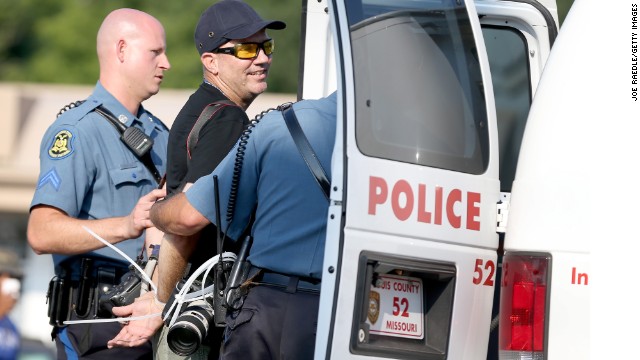(Not so) free press
Photojournalist being arrest for covering Ferguson protest.
The recent arrests of both journalists and filmmakers, alongside the arrest of the protesters, for reporting and documenting protests has begun to challenge the First Amendment. The case which has made the most news was the arrest of filmmaker Deia Schlosberg, journalist Amy Goodman, and actress and activist Shailene Woodley, all of whom were protesting or documenting the protest of fossil fuel infrastructures in North Dakota.
Woodley was taken into custody after she posted a live Facebook feed of the peaceful protest. Police targeted her because of her huge fan following, 45,000 of which watched the broadcast. Goodman had a warrant for her arrest after her footage was viewed by more than fourteen million people. That warrant has since been dropped due to general popular outrage. Her initial footage featured security guards privately hired by the Dakota Access Pipeline Company attacking the peaceful protesters. She was charged with criminal trespassing.
Even though her warrant has been dropped, there are still several warrants issued for less famous reporters and documentarians for either similar or different charges. This starts to blur the line of the First Amendments notion of “freedom of the press.” By arresting these journalist and filmmakers, the government and hired officers are stifling their reporting by arresting them on lame charges of simply reporting. So why is the line being drawn at all?
Not only were the arrests of journalists and filmmakers made at the North Dakota example, but also at Black Lives Matter rallies, and other Native rights rallies. During a Black Lives Matter protest in Baton Rouge in July, several journalists and reporters were arrested for covering and sharing videos of the protest. The arrested included a Baton Rouge’s local news journalist, Ryan Kailath from The University of New Orleans radio, and two journalist from Rochester’s news radio.
Where does it stop? A logical justification for these arrests is a sense of panic from law enforcement and government officials. At the same time, they shouldn’t be panicked because these journalist and filmmakers are just informing the public of information they are entitled to know. These reporters and filmmakers are only there to cover the protest, they aren’t actually doing any protesting themselves. If we don’t or aren’t able to cover these crucial events then what good is the media? We can’t change or solve critical problems if no one is informed of them.
These journalists and filmmakers are facing criminal charges and being treated as criminals for reporting the truth. Instead they should be granted some kind of immunity from lame charges for simply reporting because again they aren’t actually participating in the protest. This is, and should still be, an uncommon occurrence in the United States. Journalists and filmmakers shouldn’t have to worry about being arrested in the United States like if they were in the Middle East, China, or North Korea where they don’t have freedom of the press.
What do these recent arrests mean for the rest of the journalism and filmmaking industry, and how can we fight this injustice facing freedom of the press?
To help solve this issue the police or privately hired security could better conduct themselves at the protests in order to help the overall protest maintain a peaceful and general order. They can do this by arresting only those who are violent instead of those (the journalists and filmmakers) who aren’t committing any crimes. They shouldn’t arrest the journalists and filmmakers who are just trying to inform the world of activism.
Coverage of peaceful protest is a microscopic “crime” in comparison to other pertinent issues like rising gun ownership and mass shootings. Unbelievable and miss-justifiable arrests like these will only put the police officials, privately hired security guards, and government in a darker shadow than they already are.
Overall, journalists and filmmakers that cover these protest should be better protected by the First Amendment because again they are only informing the public of these protest and not actually participating themselves.

